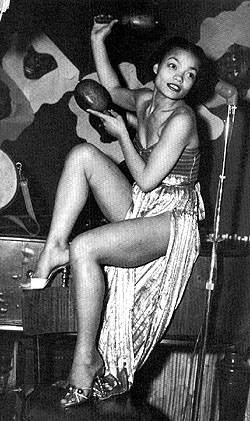RIP Eartha Kitt
27 Dec
 Most people my age remember Eartha Kitt most fondly for her role as “Lady Eloise” in the early 1990s flick, Boomerang, for which she and Grace Jones, steal the show. I was never a huge Eartha fan, but she’s always been an inspiration to me. I am always fascinated by people who are subjected to various personal hardships-poverty, violence, — politicize those experiences, and re-make themselves, both because of and in spite of the histories that would normally dictate a different kind of life. It’s not to support the “pull yourself up by your bootstraps” bullshit, but for people who still understand the larger political circumstances that created the conditions they’d be forced to endure, what is it about them that makes them make very different choices, sometimes the most improbable choices?
Most people my age remember Eartha Kitt most fondly for her role as “Lady Eloise” in the early 1990s flick, Boomerang, for which she and Grace Jones, steal the show. I was never a huge Eartha fan, but she’s always been an inspiration to me. I am always fascinated by people who are subjected to various personal hardships-poverty, violence, — politicize those experiences, and re-make themselves, both because of and in spite of the histories that would normally dictate a different kind of life. It’s not to support the “pull yourself up by your bootstraps” bullshit, but for people who still understand the larger political circumstances that created the conditions they’d be forced to endure, what is it about them that makes them make very different choices, sometimes the most improbable choices?
Earth Kitt was born in 1927 on a cotton farm in South Carolina. She was the product of rape, the daughter of a 14 year old Black/Cherokee teen and the son of the white landowner (he beat the definition slaveowner by a few decades). She was raised by her aunt, but after sufferring from various forms of abuse by a family her aunt sent her to “work” for, or what Kitt described “given away for slavery.” She often described that she got that famous growl from literally having to fight for food as a child. She thought her aunt was her mother, until she was sent to live with her mother in NYC after the aunt’s death.
Besides studying dance with Katherine Dunham, working with Orson Welles, and becoming Catwoman on the first Batman television series, Eartha Kitt was, like many Black artists of her time, blacklisted. In the 1960′s she was doing work to highlight the plight faced by Black youth in Watts (after the infamous Watts riots), and she was asked by then First Lady Ladybird Johnson to a White House event. In a conversation, Kitt told Johnson how against the Vietnam War she was, and the great architect of the modern Civil Rights Movement (according to Senator Hillary Clinton), President Lyndon B. Johnson, personally worked to ensure Kitt would not be able to work for at least 6 years.
But Eartha would resurface, and remain relevant until her very last breath, which unfortunately for us, was on Christmas day this year, at age 81. She will be remembered as a true triple-threat, and for being a Black woman who pushed a very overt and complex sexuality and sexual identity both in her youth and in her old age-a rarity in popular culture, where sexuality is rampant but is often very two-dimensional. Wanna know more? She wrote three (count em!) autobiographies – Thursday’s Child (1956), Alone with Me (1976), and I’m Still Here: Confessions of a Sex Kitten (1989).
Here’s a television biography from a decade ago that is pretty interesting:
Here’s a BBC tribute:
Tags: eartha kitt
Eartha Kitt seemed to live a fuller life than most people ever manage to do.. and it was so funny to find out that she was a voice in “The Emperor’s New Groove”